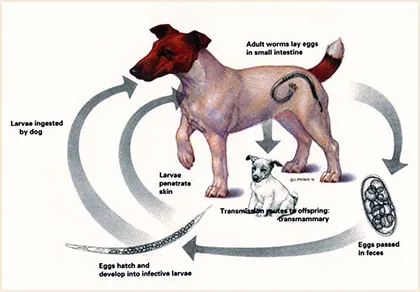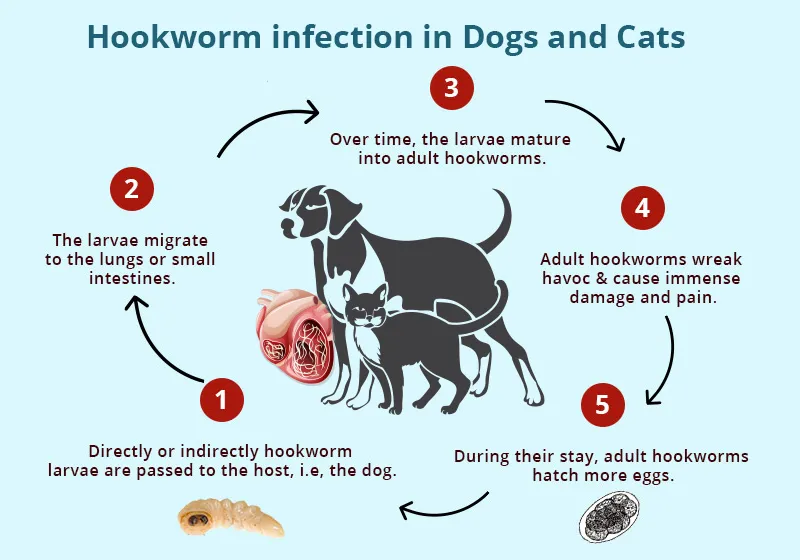Hookworms in dogs are a common parasitic infection that can lead to serious health issues if left untreated.
What Exactly Are Hookworms?
Hookworms are parasitic worms that infest a dog’s intestines. They attach themselves to the intestinal wall using their hook-like mouths, which is how they earned their name. Unlike other parasites, hookworms don’t just live inside the intestines passively—they actively feed on your dog’s blood, leading to many health issues, especially if the infection is severe.
Though these worms are tiny, typically only about 6 to 12 millimetres long, their effects can be devastating. Hookworms are not just a threat to puppies, which are particularly vulnerable; they can also impact adult dogs if not treated in time. In some cases, hookworms can even infect humans, making them a serious concern not only for your pets but also for your family.
How Do Dogs Get Hookworms?
Hookworms can enter your dog’s body in several ways. The most common route is ingestion. This can happen when a dog swallows hookworm larvae from contaminated soil, food, or water. For instance, if your dog is digging in a garden or walking in an area where other dogs have defecated, they might inadvertently pick up hookworm larvae by licking their paws or chewing on something they found in the environment.
In addition to ingestion, hookworms can infect your dog through their skin. This happens when larvae in the environment penetrate your dog’s skin—most commonly through the pads of their paws. This means that even if your dog isn’t eating anything off the ground, simply walking through contaminated soil could put them at risk.
Pregnant dogs can pass hookworms to their puppies during pregnancy or while nursing. This is why puppies are especially prone to hookworm infections, which can significantly affect their growth and development. Without prompt treatment, hookworm infections in puppies can be fatal.

Symptoms of Hookworm Infection in Dogs
Hookworms can be tricky because dogs might not show any noticeable symptoms in the early stages of infection. However, signs start to appear as the infestation progresses, which can be alarming. The most prominent symptom is anemia because hookworms feed on the dog’s blood. Anemic dogs may seem weak, lazy, and have pale gums. In severe cases, they may collapse or show difficulty breathing.
Other symptoms include weight loss, diarrhea (sometimes bloody), a dull coat, and general weakness. If your dog suddenly becomes less active or appears to be in pain, it could be a sign of a hookworm infection. Puppies are especially vulnerable and may exhibit stunted growth or developmental delays if they have a hookworm infestation.
One of the most dangerous aspects of hookworm infections is that they can go unnoticed for a long time, slowly sapping your dog’s strength. That’s why watching for subtle changes in your dog’s health or behaviour is essential.
Diagnosing Hookworm in Dog Infections
If you suspect your dog might have a hookworm infection, seeing a veterinarian as soon as possible is essential. Your vet will likely perform a fecal examination to check for hookworm eggs. These eggs are passed in the dog’s stool and can be detected under a microscope.
However, even if the test returns negative, it doesn’t necessarily mean your dog is hookworm-free. In some cases, the infection might still be in its early stages, or the worms may not be releasing eggs at the time of the test. Regular fecal examinations are essential, especially if your dog has frequent contact with soil, other dogs, or areas where infections are common.
How Are Hookworm in Dogs Infections Treated?
The treatment for hookworms is usually straightforward. Your veterinarian will prescribe a deworming medication that kills the adult worms in your dog’s intestines. This medication may need to be given multiple times and spaced out over a few weeks to ensure that any newly hatched larvae are also eliminated.
In cases of severe anemia, your dog may require additional treatment, such as iron supplements or blood transfusions, to recover fully. Puppies with hookworm infections may need more intensive care, as their smaller bodies are less able to cope with the blood loss caused by hookworms.
After treatment, keeping your dog’s environment clean is essential to prevent reinfection. Hookworm larvae can survive in the soil for weeks or even months, so thoroughly cleaning up your dog’s waste and avoiding areas where hookworms are known to be present is essential.

Preventing Hookworm Infections
Preventing hookworm infections in dogs is more accessible than treating them. Regular deworming, as part of your dog’s routine veterinary care, is the most effective way to protect your pet from hookworms. Many heartworm preventatives also protect against hookworms, so ask your vet about combination treatments that provide broader protection.
Keeping your dog’s living area clean is equally important. Regularly remove and properly dispose of your dog’s feces, as this is the primary way hookworms spread in the environment. Avoid letting your dog roam where other animals frequently defecate, and be mindful of where your dog digs or sniffs when outdoors.
If your dog is pregnant or nursing, speak with your vet about deworming to prevent passing hookworms to the puppies. Puppies should also be dewormed regularly, as they are especially vulnerable to hookworm infections.
Hookworms in Dogs Hookworms in Dogs Hookworms in Dogs Hookworms in Dogs Hookworms in Dogs Hookworms in Dogs Hookworms in Dogs Hookworms in Dogs
Conclusion
Hookworms might be a hidden danger, but with the proper knowledge and precautions, you can protect your dog from this harmful parasite. Regular veterinary care, proper hygiene, and a vigilant approach to your dog’s environment will go a long way in keeping your pet healthy and free from hookworms. Don’t let these tiny parasites cause significant problems for your dog—take action today to ensure their well-being.